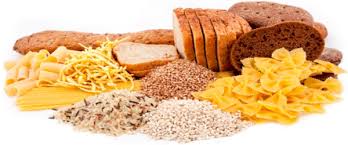carbohydrate
英 [ˌkɑː.bəʊˈhaɪ.dreɪt]
美 [ˌkɑːr.boʊˈhaɪ.dreɪt]
- n. [有化] 碳水化合物;[有化] 糖类
使用频率:

记忆方法
记忆“carbohydrate”可以将其拆分为“carbo-”和“-hydrate”,其中“carbo-”联想到“carbon”(碳),而“-hydrate”联想到“hydro”(水)。想象碳和水结合形成了一种化合物,这有助于记住“carbohydrate”是碳、氢、氧组成的碳水化合物。
以上内容由AI生成, 仅供参考和借鉴
中文词源
carbohydrate 碳氢化合物
carb, 碳,见carbon. -hydr, 氢,水,见hydrate.
英语词源
- carbohydrate (n.)
- 1851, from carbo-, comb. form of carbon, + hydrate (n.), denoting compound produced when certain substances combine with water, from Greek hydor "water" (see water (n.1)).
The name carbohydrate was given to these compounds because, in composition, they are apparently hydrates of carbon. In structure, however, they are far more complex. [Flood]
权威例句
- 1. Athletes usually eat a high carbohydrate diet.
- 运动员通常吃高碳水化合物食物.
- 2. Cashew nuts are rich in carbohydrate.
- 腰果含丰富碳水化合物.
- 3. Fill up on potatoes, bread and pasta, which are high in carbohydrate and low in fat.
- 用碳水化合物含量高、脂肪含量低的土豆、面包和意大利面食填饱肚子。
- 4. The rejected carbohydrate matter is cellulose and other higher polysaccharides.
- 排泄样的碳水化合物是纤维素和其它较高的多糖.
- 5. You should not have too much carbohydrate in your diet.
- 你日常饮食中不该有过多碳水化合物.